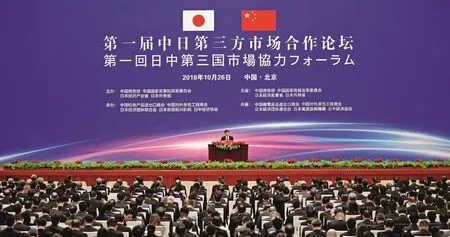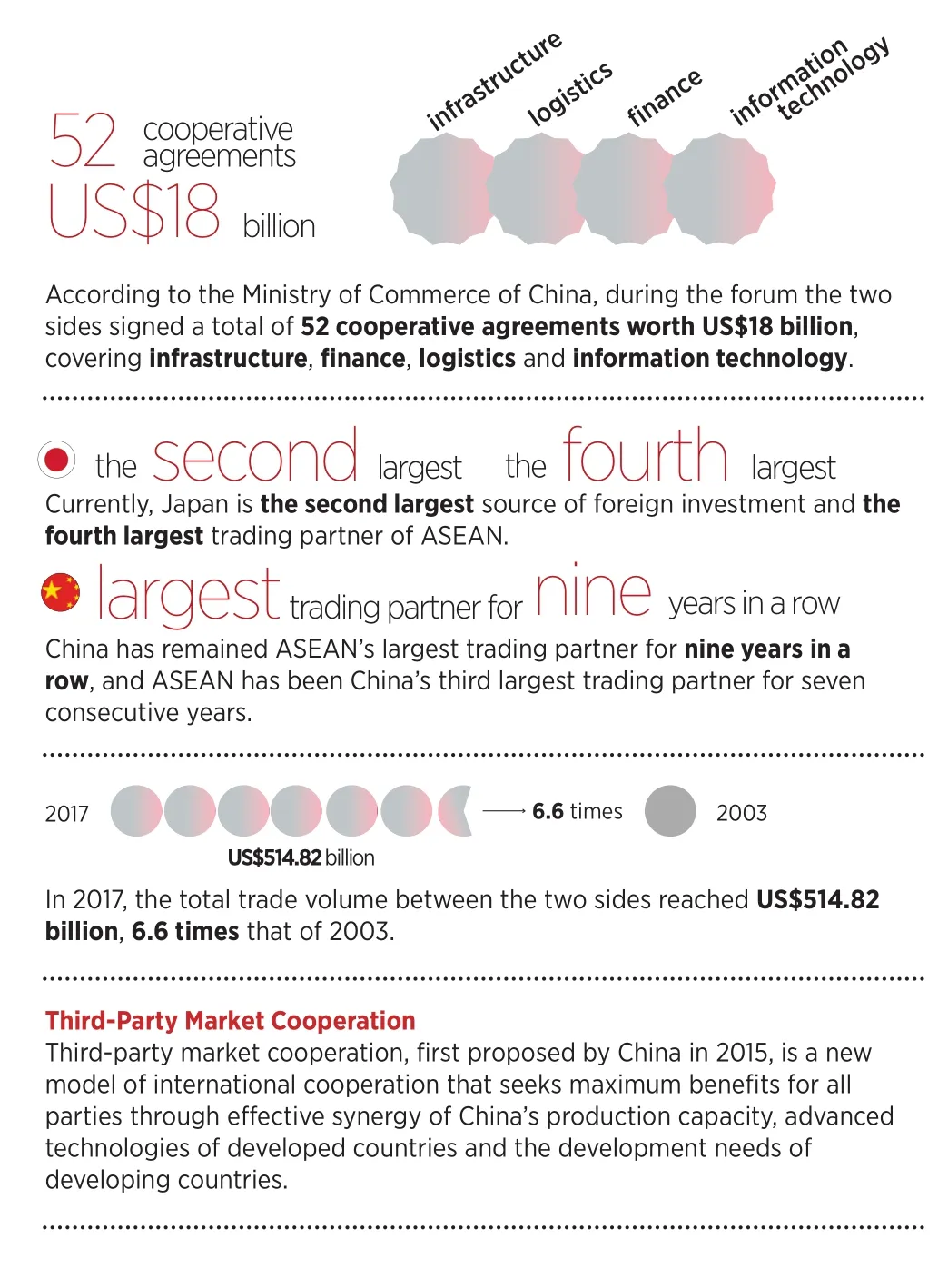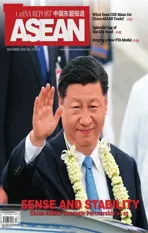CHINA-JAPAN THIRD-PARTY COOPERATION TAKING OFF FROM AsEAN
2018-12-25ByWangFang
By Wang Fang
From October 25 to 27, Japanese Prime Minister Shinzo Abe visited China. It was the first official visit by a Japanese prime minister in seven years.During their meeting on October 26, Chinese President Xi Jinping noted that the Belt and Road Initiative has provided a new platform and experimental field for China and Japan to deepen their mutually beneficial cooperation. Calling the Initiative “promising,” Abe declared that Japan was willing to expand cooperation with China in a wide array of sectors including the exploration of third-party markets.
During Abe’s three-day visit, multiple cooperative agreements were reached between China and Japan involving such areas as economics, security,technological innovation and cultural exchange. The two sides signed more than 50 deals related to thirdparty market cooperation alone. The visit is expected to bring bilateral relations into a new era, Abe said on a social media platform.
Broad Prospects
A memorandum on third-party market cooperation between China and Japan was signed when Chinese Premier Li Keqiang visited Japan in May this year, and the document has served as political foundation as well as a policy guarantee for cooperation between companies of both sides in overseas markets.
On October 26,the second day of Abe’s visit in China, the First China-Japan Third-Party Market Cooperation Forum was held in Beijing. According to the Ministry of Commerce of China, during the forum the two sides signed a total of 52 cooperative agreements worth US$18 billion, covering infrastructure,finance, logistics and information technology.Japanese media reported the event with headlines like“Dawn of a New Era of Japan-China Cooperation” and“From Competition to Coordination.”

Chinese Minister of Commerce Zhong Shan delivers remarks at the First China-Japan Third-Party Market Cooperation Forum held in Beijing on October 26. The event was co-sponsored by the Ministry of Commerce of China, the National Development and Reform Commission of China, the Ministry of Economy, Trade and Industry of Japan and the Ministry of Foreign Affairs of Japan.
Japanese experts and the public alike believe it is very important for Japan and China to strengthen economic cooperation against the background of the rise of protectionism and deglobalization. Their cooperation in third-party markets enjoys broad prospects, especially in countries and regions along the Belt and Road.
Nikkei, a major financial newspaper based in Tokyo,reported on October 27 that Abe’s visit to China paid off with the two countries managing to reach consensus on cooperation in opening up third-party markets,which was highlighted by the decision to resume joint development of industrial zones in Thailand.According to Sankei Shimbun, another major Japanese daily newspaper, Li and Abe agreed to launch thirdparty market cooperation on infrastructure projects like joint investment in infrastructure by enterprises of both sides and construction of smart cities in Thailand.
It was reported that Thai companies represent the only third party confirmed in the agreement between China and Japan, making Thailand a test field for Sino-Japanese collaboration in this area.
The governments of China, Japan and Thailand have already embarked on trilateral cooperation on Thailand’s flagship project of its development initiative. On May 31 of this year,representatives from the three countries attended a seminar themed“China-Japan Cooperation on the Eastern Economic Corridor (EEC) of Thailand” in Bangkok. They praised the EEC and expressed willingness to increase trilateral business cooperation.

Ning Jizhe, deputy head of the National Development and Reform Commission of China, said at the event that leaders of China, Thailand and Japan all attach great importance to trilateral cooperation on Thailand’s EEC and that such cooperation is tremendously significant with a high upside. Thai Minister of Industry Uttama Savanayana emphasized that the development strategies of Thailand, China and Japan are highly complementary, adding that trilateral business cooperation will not only benefit the three countries, but also help promote development of the surrounding areas. Japanese Ambassador to Thailand Shiro Sadoshima noted that the Japanese government is willing to work to foster greater business cooperation among the three countries and create an ideal environment for realizing win-win outcomes across all parties.
ASEAN as a Starting Point
This year marks the 40th anniversary of the Sino-Japanese Treaty of Peace and Friendship, which offers China and Japan an opportunity to improve bilateral relations and cooperation in third-party markets. In this context, ASEAN countries can become the starting point for third-party market cooperation between China and Japan within the Belt and Road framework.
First, ASEAN has enormous demand for foreign investment. Southeast Asia has become one of the most attractive destinations for global investors. With most ASEAN member states emerging or developing in the early or middle stages of industrialization and urbanization, they all have huge demand for investment in infrastructure and manufacturing.According to the Tokyo-based Asian Development Bank Institute, in the infrastructure sector alone, a total of US$3.15 trillion is needed from 2016 to 2030 to fund the economic development of ASEAN countries.Chinese and Japanese companies have been presented with a vast market for business cooperation in the region.
Second, regional economic integration has strengthened investment and trade relations of ASEAN, China and Japan. Currently, Japan is the second largest source of foreign investment and the fourth largest trading partner of ASEAN. In the 1980s,Japanese enterprises established many factories in ASEAN nations as part of their global manufacturing networks. With these countries’ economies booming in recent decades, Japanese products continue to expand their market share in ASEAN. China has also built close economic ties with ASEAN. It has remained ASEAN’s largest trading partner for nine years in a row, and ASEAN has been China’s third largest trading partner for seven consecutive years. In 2017, the total trade volume between the two sides reached US$514.82 billion, 6.6 times that of 2003. Chinese firms have expanded investment in ASEAN countries in a wide range of industries, growing from manufacturing,mining and wholesale and retail to energy and telecommunications infrastructure.
Third, East Asian economic integration propelled by the development of ASEAN can produce winwin results for all parties. The trend of economic integration in East Asia has been prominently led by the establishment of ASEAN, and the organization now serves as an important platform for promoting regional cooperation. As East Asia now enters a transitional period of building a new economic order in the region,trilateral cooperation among China, Japan and ASEAN enjoys broad prospects. The economic integration of ASEAN can benefit from Sino-Japanese cooperation,for which the Belt and Road Initiative has laid a good foundation. China and Japan should make concerted efforts to accelerate regional economic integration in East Asia because not only is it in the interests of China and Japan, but it is in the common interests of all countries in the region.
